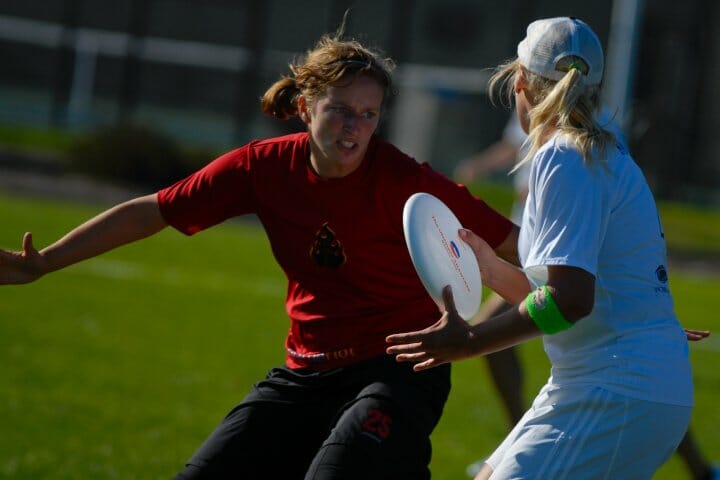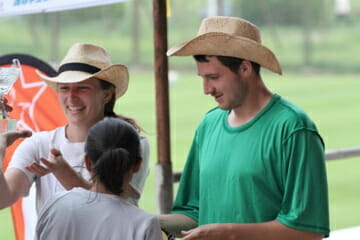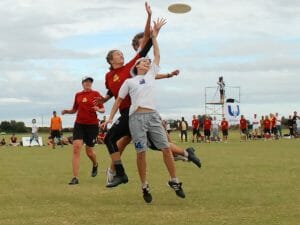March 26, 2013 by Matt Dagher-Margosian in Interview, Other with 14 comments
 The second ever Dalian Open is just as improbable as the fact that there was a first. It’s just as improbable that I am here, and that enough people to make a team called Shanghai Huwa are here. We walk off the bus and onto a knotted concrete pavement, where onlookers stop playing spirited games of no-defense basketball and badminton over a tennis net. Dalian: it’s a nice enough city for China. It’s clean, it has beaches, and there is plenty of squid-on-a stick.
The second ever Dalian Open is just as improbable as the fact that there was a first. It’s just as improbable that I am here, and that enough people to make a team called Shanghai Huwa are here. We walk off the bus and onto a knotted concrete pavement, where onlookers stop playing spirited games of no-defense basketball and badminton over a tennis net. Dalian: it’s a nice enough city for China. It’s clean, it has beaches, and there is plenty of squid-on-a stick.
But even now if you asked me why I was there, I would have to put on the same silly grin I did when the local population walked up to us and pointed at our cleats, our visors, or our plastic. Only this time I’m not with 20 other people with the same silly grins, pointing to their frisbees and miming soft tosses saying over and over:
“Women dou wanr ‘Feipan'” … We all play frisbee.
The locals understood the words but they didn’t understand the sport, even when some of the more advanced Mandarin speakers tried to explain. And while we all understood the sport, I think very few of us understood the meaning, the significance of the moment behind our goofy grins. United by a common love of Feipan, we found ourselves thousands of miles away from our homes, locked into an activity we loved. Men and women. English teachers and stoners. The athletic and the scrubs. Brought together by the sport we loved in a country we ended up in randomly, with a group of people we did not know.
And on that day, I did not expect to play at the second annual Dalian Open with perhaps the greatest athlete in the history of women’s Ultimate.
***
Western athletes in Asia tend to be those on their last legs. Searching for one last moment, one last check, one last period of time where, even though they are in a strange land, they can relive the glory — or the money — to which they have become accustomed.
You can watch Tracy McGrady play basketball in Qingdao or Manny Ramirez play baseball in Taiwan. Here, in Asia, they get what they couldn’t in their homeland; they get one last shot.
But in Ultimate, heading East doesn’t promise the same kind of returns. There’s no big paycheck and there’s no prestigious titles to win. So how did Miranda Roth, one of ultimate’s all-time greats, end up playing Ultimate in China?
I’ve been an athlete my entire life. My dad was a basketball coach. He and I used to talk about basketball for hours. I was the captain of the basketball team at Paideia High School. But…How did I get into Ultimate? That’s a good question. I was first a quitter of women’s Varsity soccer at Paideia High School. The last two years I played for the men’s Varsity Ultimate Frisbee team. Then I went to Carleton after the high school team recommended them to me. They were great athletes who cared about each other. Then I played for Riot. And women at the level of Riot, sacrifice just as much, if not more, than men at that level. The time commitment over seven years was intense. At Riot we’d always have one track workout every week, which was stadium work or staircases for one to two hours. We’d always have one weeknight practice. We’d always push ourselves to do this on a work night. Then we’d have tournaments on weekends.

Four years prior, when I first played with Miranda in Dalian, quitter is the last word I would associate with her; sacrifice may be one of the first. I sat on the sideline before our first game and watched her toss with her husband, Matthew Knowles (an elite Ultimate player in his own right, formerly of Seattle’s Sockeye), who had come to China to be with the love of his life as she worked abroad at YK Pao international boarding school.
I was able to listen to both their dialogue and their bodies, knowing that under their wisecracks and banter lay the language that had really drawn them together. As they tossed and stretched I could hear their bones cracking and ligaments popping: the groans and creaks of their bodies. Those bodies, once pristine instruments, were now pawnshop Stradivariuses, having to painfully tune themselves to play to their elite potential.
My attitude comes from being an athlete my entire life and watching sports my entire life with my Dad…I’ve always admired people who can “push through.” I’ve had four career ending injuries: two ACL repairs, slipped discs in my back (which makes me numb and immobile on one side of my leg), and I’ve dislocated my ankle. For me, and I’m speaking for many of my teammates/opponents as well, that doesn’t stop us.
The first three to four games of the tournament blend together, as the several club level players mixed into our vagabond team show no mercy to the high-school or college boys and girls we’re playing against, many of whom probably saw this sport for just the second time at the second annual Dalian Open. Young Chinese men and women are cheering us on as we stack up tournament win after tournament win. And throughout all of these goofy pointless games, Miranda Roth is wincing. But she’s still competing.
In women’s Ultimate, absolutely there are women who are playing through a great deal of pain. That shows how much we love the game and the teams that we’re willing to do that. I have definitely put Frisbee first, ahead of my health, career, and personal life. Now looking back on it, I have bad arthritis in both of my knees and I have numbness, weakness. Would I want any of my players to have that? No.
Our imperial reign lasts all the way until we play the yin to our yang: Beijing’s Big Brother. They were another team of polyglots and occupations, as well as differing skill levels from Nationals-level players to those on the fringe, who dreamed of playing with the elite. For both teams, a line of seven took to the field, mixed in experience and talent. While from the sidelines cheers rang out.
“Beijing JIA YOU!” “Shanghai JIA YOU!”
The crowd of the recently vanquished behind us, a suddenly random tournament became a cultural ambassadorship for the two flagship cities of China, and the expats that they harbored. I’m on the line with Miranda, who I nervously looked to for guidance.
It’s not simple to get “to the top.” I was pushed in all sports by my dad and my coaches. I was always a pretty smart player on the court or on the field. But I had to work hard.

I immediately try to get the disc out of my hands and to a more experienced player. I watch in horror, though, as my first pass to Miranda loops just out of her reach. But as it slides off her fingers and into the dirt, she looks more disgusted with herself than with me. Jogging back to her defender she whispers as she passes:
“I would have gotten that if I was healthy.”
There is a wax and wane between cockiness (you’re better than everybody and kick everyone’s butt) and a real ability to be humble and learn all the time. There are many players that are so cocky that they miss opportunities. [But] there are players that are a bit “meek,” which you see in women’s athletics, who don’t find that fire or cockiness to be pushed to that next level.
For the next half of the game, I’m not talking to Miranda or my fellow handlers. I’m talking to myself, furious that I let my team down, furious that I let the fans down. Furious that I let myself down.
If someone beats you, breaks your mark, whatever, you can’t get pissed off, you have to learn about it. Fix what you were doing, emulate them.
Later in the game, Miranda takes off deep. Two men are trying to gracefully box her out. With the subtlety of a petite boulder, or a dainty wrecking ball, she shoulders both out of the way for the sky. The men and women on the sidelines cheer unanimously for her. Around us, Mandarin-speaking members of our team are whipping the crowd into a frenzy:
“Miranda Jia You! Miranda Jia You!”
She reacts with the grace and poise of an athlete who has done this a hundred times. A smile on her face momentarily, before setting the disc gently down on the grass and converging with her team in the huddle.
In high-level Ultimate in the states, any teams that have players that are putting themselves first as individuals, they’re not willing to succeed. Yes, there are amazing players. Fury is a dynastic team. Alex Snyder is one of the best players in the game. But everything she does is because she wants Fury to be together.
My perception for Men’s [ultimate] is, some of these guys are playing because they’re good at it, not for the relationships of their teammates. Those relationships make you connect better with your receiver or your thrower and women yearn for this.

That game is one of hundreds where she’s made that play or one even more spectacular. Unfortunately, we all only have one body and right now Miranda’s is moaning and stretching. And sitting next to her, I’m nursing a bottle of Tsingtao and my own bruised ego. I have to wonder why she’s here. I wonder why the hell she would keep playing. The toes stubbed, the elbows banged, the cartilage lost, the ligaments shredded, why would this woman, who has done so much, keep playing this sport, at a tournament as absurd as the second annual Dalian Open?
Three years later, I’m no longer a teacher, I’m a travel agent having long since given up my dream of getting to Nationals or educating children. Miranda, by sheer will, has achieved another dream: landing a teaching job at Paideia High School in Atlanta, her alma mater, where she will be teaching science and coaching ultimate full-time. She’s also planning to tryout for Atlanta’s Ozone.
I can understand a bit in Shanghai, playing with her husband, the joys of living and coaching in another country (she and Matt coached several clinics around Asia to much acclaim). But to come back to the United States, after having the hell beat out of you, why, Miranda, are you still playing Ultimate?
There is a giant hole in my life where my teammates used to be. I miss deeply the relationship with all my teammates in Seattle. It’s different when seeing people four times a week. Or having people to eat meals with, go to movies with. More than the Ultimate itself I miss the Ultimate players. With retirement looming, it is very important for me to form some of those relationships with the Ozone girls, women I should say. To have those relationships as long as I can. It won’t be a seven year commitment like Riot was. But wherever I am, I can still contribute to a women’s club team. My throws are still good, and I still draw a good defender. My strengths in Ultimate are also in the leadership, the knowledge, and the teaching I can do. I want to learn from those Ozone girls, and try to bring something to their team.
I guess for some, the dreams never die, and that’s what makes them great.